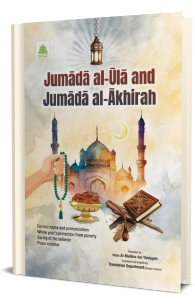
Our Pious Predecessors
Mawlana Abu Majid Muhammad Shahid Attari Madani
Jumāda al-Ūlā is the fifth month of the Islamic year. From the Companions, scholars, and saints who passed away in this month, 110 have been mentioned in previous editions of Faizan-e-Madinah Monthly Magazine (1438 – 1445 AH).
A further 11 are mentioned herein:
Companions of Allah’s Messenger رَضِیَ الـلّٰـهُ عَنْهُم
Martyrs of the Battle of Ajnādayn:
On the 27th of Jumāda al-Ūlā 13 AH, the Battle of Ajnādayn took place during the caliphate of Abū Bakr al-Ṣiddīq رَضِىَ اللّٰهُ عَـنْهُ. Muslims, led by Amr b. al-As رَضِىَ اللّٰهُ عَـنْهُ, fought a successful battle against a Roman army at Ajnādayn, although many Companions رَضِیَ اللهُ عَنْهُم were martyred.[1]
1. The Companion, Ḥārith b. Ḥārith al-Qarashī al-Sahmī رَضِىَ اللّٰهُ عَـنْهُ was the son of Ḥārith b. Qays, a wealthy leader of the Quraysh. He accepted Islam and become a Companion of Allah’s Messenger صَلَّى اللهُ عَلَيْهِ وَاٰلِهٖ وَسَلَّم, along with his seven brothers: Abū Qays, ʿAbdullah, Sāˈib, Bishr, Saʿīd, Tamīm and Maʿmar رَضِیَ الـلّٰـهُ عَنْهُم. They later migrated to Abyssinia and then to Medina. He was one of the Companions martyred in the Battle of Ajnādayn.[2]
Saints of Islam رَحِمَهُمُ الـلّٰـهُ
2. Abu al-Ghayth b. Jamīl Yemenī رَحْمَةُ الـلّٰـهِ عَـلَيْه was a saint and senior scholar of Yemen. He displayed many saintly miracles and established a khanqa in Ata, seventy kilometres from away from Hadida. Born in 603 AH in Kufa, he passed away in Yemen on the 25th of Jumāda al-Ūlā 651 AH. His shrine can be found in the Ata khanqa.[3]
3. Khūbullah Yaḥyā Ilāhabād Qādirī رَحْمَةُ الـلّٰـهِ عَـلَيْه was born in Ilahabad (UP; India) in 1080 AH, and later passed away there on the 11th Jumāda al-Ūlā or Jumāda al-Ākhira 1143 AH. He was the nephew, student, murīd, and khalifa of Aḥmad Afḍal Ilāhabādī, and renowned as a spiritual authority and God-fearing personality.[4]
4. Muhammad Akbar ʿAlī Chishtī Mīrwī رَحْمَةُ الـلّٰـهِ عَـلَيْه was born in Mianwali in 1301 AH and passed away there on the 27th of Jumāda al-Ūlā 1376 AH. Both scholar and gnostic, he was a murīd and khalifa of Aḥmad Mīrwī, public speaker/imam at a masjid in Mianwali, a reputable personality, and shaykh of a spiritual order.[5]
5. A descendant of Khāja Muʿīn al-Dīn Chishtī رَحْمَةُ اللهِ عَلَيْه, Sayyid Yaʿqūb Suhāwī رَحْمَةُ الـلّٰـهِ عَـلَيْه was born in 1297 AH in Sohawa, Kashmir. After acquiring elementary knowledge from his father, he studied under the tutelage of Muhammad Gul Chishtī, ʿAbdullah Garhī Sharīf, Mehr ʿAlī Shāh, and other prominent figures. He was a murīd and khalifa of his father. After the latter’s passing, he became his successor in the Chishtiyya Niẓāmiyya spiritual order of Sohawa. He passed away on the 27th of Jumāda al-Ūlā 1377 AH and is laid to rest next to his father.[6]
6. Sayyid Muhammad Ḥusayn Jamāʿatī رَحْمَةُ الـلّٰـهِ عَـلَيْه was born in 1297 AH in Alipur. He passed away on the 6th Jumāda al-Ūlā 1381 AH and is laid to rest next to his father, Sayyid Jamāʿat ʿAlī Shāh. Along with having committed the Quran to memory, he was a scholar in Ḥanafī jurisprudence, and taught others how to become scholars.[7]
Scholars of Islam رَحِمَهُمُ الـلّٰـهُ
7. ʿAlāˈ al-Dīn Aḥmad b. Muhammad Sīrāmī رَحْمَةُ الـلّٰـهِ عَـلَيْه was an expert scholar of Ḥanafī jurisprudence and an excellent teacher. He taught in Herat, Khwarazm, Tabriz, Aleppo, Syria and Cairo. Some of his notable students include Sirāj al-Dīn ʿUmar Ḥanafī and Badr al- Dīn Maḥmūd ʿAynī. He passed away on 3rd Jumāda al-Ūlā 790 AH or 795 AH in Cairo. Many attended his funeral before his burial in the Sultan cemetery.[8]
8. Shams al-Dīn Abū ʿAbdullah Muhammad b. ʿAlāˈ al-Dīn Bābilī رَحْمَةُ الـلّٰـهِ عَـلَيْه was born in 1000 AH in Menofia, Egypt. He passed away on the 25th of Jumāda al-Ūlā 1077 AH in Cairo. He travelled far and wide to learn hadith, Shāfiʿ ī jurisprudence, and other sciences. He also studied under Arabian scholars, particular those of Mecca. It is said he made dua during Laylat al-Qadr seeking to be a expert of hadith like Ibn Ḥajar ʿAsqalānī; a prayer which was accepted and led to him attaining the status he did. He had memorised countless hadith and was a master in Shāfiʿ ī jurisprudence. He also was a teacher, shaykh, and prolific reciter of the noble Quran.[9]
9. Asrār al-Ḥaqq Ṣiddīqī Rahtakī رَحْمَةُ الـلّٰـهِ عَـلَيْه was born in 1296 AH in Tonk, India. He passed away on the 30th of Jumāda al-Ūlā 1373 AH in Karachi, and is laid to rest in the Mewa Shah graveyard. He was a proficient scholar, excellent orator, poet, a famous imam in Karachi, and staunch aspirant of Imam Aḥmad Razā Khān رَحْمَةُ اللهِ عَلَيْه.[10]
10. Aḥmad Din Dargāhī رَحْمَةُ الـلّٰـهِ عَـلَيْه was born to a spiritual and knowledgeable family in 1900 AD and passed away on the 9th of Jumāda al-Ūlā 1414 AH. Alongside teaching Islamic sciences in Dār al- ʿUlūm Ḥizb al-Aḥnaf Lahore, he was a murīd of Shaykh Qasim Muharwī رَحْمَةُ اللهِ عَلَيْه, an excellent orator, and a man of great character. He spent his life teaching in Lahore, Haroonabad, and his hometown.[11]
11. Sayyid Maḥbūb Kāẓimī رَحْمَةُ الـلّٰـهِ عَـلَيْه was born in 1321 AH in Tarbela, Attock. He passed away on 25th Jumāda al-Ūlā 1418 AH in Hassan Abdal. A graduate of Dār al- ʿUlūm Ḥizb al-Aḥnaf Lahore, he was a murīd and khalifa of Qāḍī Muhammad ʿAbd al-Raḥīm Naqshbandī, the orator of Masjid Hassan Abdal, an author of many books, and an advocate of Tahreek-e-Pakistan and Tahreek-e-Khatm-e-Nubuwwat.[12]
[1] Al-Bidāyat wa al-Nihāya, vol. 5, pp. 124-170
[2] Usd al-Ghāba, vol. 1, p. 470
[3] Al-ʿUqud al-Luˈluˈiyya, vol. 1, pp. 107-110
[4] Millat Rājshāhī, pp. 92-93, 370
[5] Tadhkira Akābir Ahl-i-Sunnat, pp. 66-68
[6] Fayzān-i-Sayyid ʿAlī, pp. 212-223
[7] Sīrat-i-Amīr-i-Millat, pp. 670-689
[8] Al-Manhal al-Ṣāfī, vol. 2, pp. 172-175
[9] Al-Aʿlām, vol. 6, p. 270
[10] Rōshan Darīchē, pp. 337-339
[11] Hayāt-i-Imām al-Muḥaddithīn, pp. 447-449
[12] Tadhkira Ulema Ahl-i-Sunnat Zila Attock, pp. 265-268
















Comments